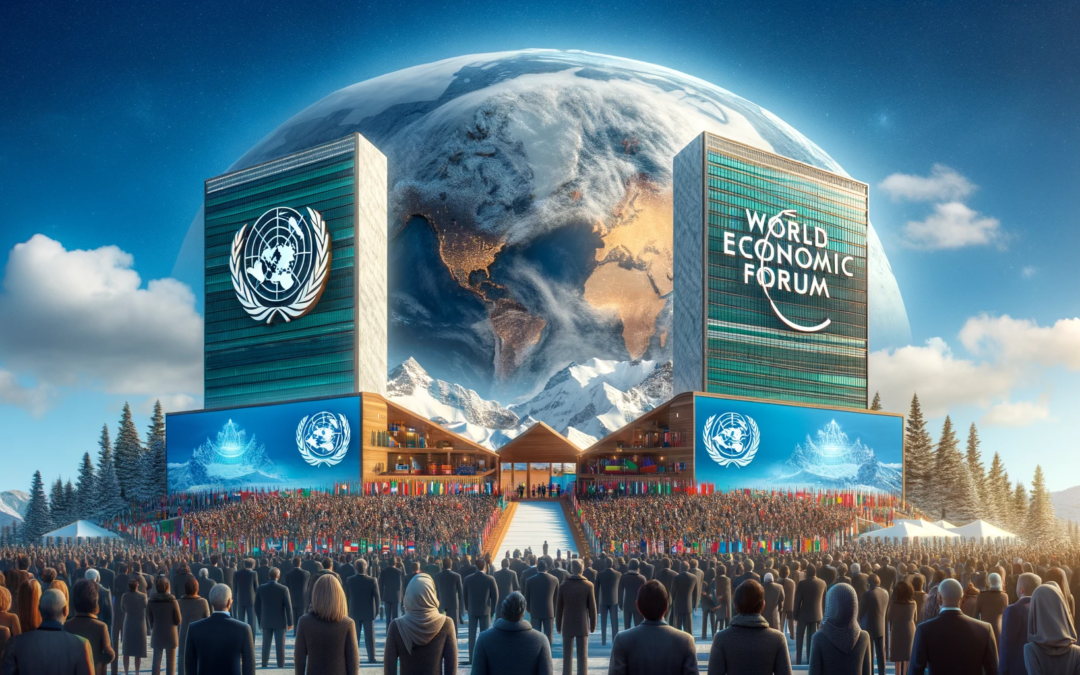In the shifting landscape of global governance, 2023 marked a historical juncture with the fusion of two major international entities: the United Nations (UN) and the World Economic Forum (WEF). This merger, unprecedented in scale, brought together the realms of politics and economics in a manner previously unimaginable. While this union holds potential for sweeping changes across various facets of international relations, it also raises significant concerns and controversies, particularly around the themes of power dynamics, transparency, and representation.
The Genesis of the Merger: Roots in Different Soil
To fully grasp the magnitude of this merger, one must first consider the origins and purposes of the UN and WEF. The United Nations, conceived in the aftermath of World War II, was designed as a beacon of international peace, cooperation, and humanitarianism. Its mission centered around collective security and global harmony. The World Economic Forum, on the other hand, emerged as a gathering of economic leaders and thinkers, dedicated to shaping the world’s economic landscapes. Its inception in 1971 marked the beginning of a platform where business and politics converged to influence global and regional economic strategies.
The merging of these two organizations signified not just an alignment, but a fusion of political and economic agendas, sparking a radical shift in the global order.
The Dark Side of the Merger: A Convergence of Concerns
While the merger has been lauded for its bold vision, it has also attracted a myriad of criticisms and concerns, primarily focused on the potential negative ramifications.
Concentration of Power: The most glaring issue is the centralization of power. This merger effectively places an enormous amount of global influence in the hands of a single entity. Such concentration raises fears of a monopolistic control over global policy-making, potentially overriding the autonomy of individual nations. The risk here is the creation of a global oligarchy, where decisions are driven by a select group of leaders, disregarding the needs and voices of the less powerful.
Transparency and Accountability Deficit: Another significant concern is the lack of transparency and accountability. The UN, despite its criticisms, operated under a framework of diplomatic scrutiny and was subject to the oversight of its member states. The WEF, in contrast, functioned largely as a private entity with less obligation for public accountability. The fusion of these two bodies potentially leads to a governance model that is less transparent, where decision-making processes are obscured, and accountability mechanisms are diluted.
Erosion of Democratic Values and Sovereignty: The merger also poses a threat to democratic values and the sovereignty of nations. With economic considerations deeply enmeshed with political agendas, there is a risk that the economic priorities of the wealthiest nations and corporations could overshadow the democratic needs and voices of smaller, less affluent states. This could lead to a scenario where policies are disproportionately influenced by economic powerhouses, further marginalizing the interests of the developing world.
Representation and Equity: The new entity’s ability to represent equitably the interests of all nations is dubious. The inherent imbalance in economic power among nations suggests that the merged organization might favor the interests of the economically powerful, leaving behind the concerns of the economically weaker states. This imbalance could exacerbate existing inequalities, both within and between nations.
Impact on Global Economy and Development: While the merged entity aims to influence global economic policies positively, there are apprehensions about its effectiveness in promoting sustainable development and social equity. The convergence of economic and political agendas might lead to a prioritization of economic growth over social welfare, environmental sustainability, and human rights.
Looking Forward: Navigating a Path Fraught with Challenges
As the world ventures into this new era of merged global governance, it watches cautiously. The potential of the UN-WEF merger to fundamentally reshape international politics and economics cannot be understated. However, this path is laden with challenges that need to be addressed critically.
The concerns surrounding this merger underscore the need for rigorous mechanisms to ensure that power is not abused, transparency is upheld, and the voices of all nations, especially the less powerful, are heard and considered. The global community must remain vigilant, ensuring that this unprecedented consolidation of power does not trample upon the principles of democracy, equity, and justice.
The unfolding narrative of the UN-WEF merger has transformed from a story of ambition and aspiration to a rallying cry for nations fiercely guarding their sovereignty. This merger has become a crucible, testing the resolve of countries to stand against what many see as a monopolization of global governance. Nations are increasingly vocal about the threat this consolidation poses to their autonomy, with several considering a dramatic step: withdrawing from the UN to preserve their independence.
Countries like Brazil and India, proud of their growing economic and political influence, are voicing concerns about losing control over their national policies. Brazil, with its vast natural resources and a strong stance on environmental sovereignty, fears that global policies dictated by this new entity might undermine its own developmental goals. India, a nation that has long championed non-alignment and self-reliance, sees this merger as a potential infringement on its right to chart its own economic and political course.
Smaller nations, too, are in the fray. Countries like Norway and New Zealand, known for their progressive and independent policies, are debating the implications of remaining part of an organization that might constrain their ability to make decisions aligning with their unique national values and priorities.
This merger, initially seen as a beacon of unified strength, is now a symbol of overreach, prompting a defiant stand by nations intent on protecting their sovereignty. It’s a reminder that the quest for a fair and equitable global order must not trample on the rights of nations to self-determination. As this story unfolds, the world watches as countries weigh the cost of membership against the value of their independent identity and the right to self-governance.










